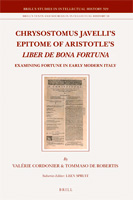Valérie Cordonier (CNRS, SPHere) et Tommaso De Robertis
“Chrysostome Javelli (1470/71-1538 ?) a composé, à une époque décisive pour l’histoire de la pensée européenne, un ensemble de commentaires d’Aristote couvrant la quasi-totalité du corpus. Ce livre, le premier entièrement consacré à Javelli, se concentre sur son épitomé du Liber de bona fortuna, compilation des deux chapitres sur la bonne fortune dans les Magna moralia et l’Ethique à Eudème produite dans les années soixante du 13e siècle. L’épitomé de ce Liber par Javelli témoigne de la familiarité de son auteur avec la tradition scolastique et, surtout, de sa capacité à former à partir de là des idées originales qui ont significativement enrichi la tradition péripatéticienne.
Le Ch.1 du livre résume ce qu’on sait de la genèse et la réception du Liber de bona fortuna. Le Ch.2 présente la vie de Chrysostome Javelli et son œuvre philosophique. Le Ch.3 détaille le contenu de son épitomé du Liber. Le Ch.4 étudie les citations et les usages de cet opuscule aristotélicien dans les autres ouvrages de Javelli (commentaires et œuvres personnelles). Le Ch.5 donne l’édition et la traduction des deux versions conservées de l’épitomé sur le Liber et discute leurs relations du point de vue de leur genèse et de leur contenu.
”
Table des matières
Acknowledgements
List of Figures
Introduction
1 The Liber de bona fortune : Its Origin and Early Diffusion
- 1 The Textual History of the Liber in the Context of the Rediscovery of Aristotle’s Ethical Works
- 2 Aquinas’s Innovative Reading of the Two Chapters Making up the Liber : Summa contra Gentiles III, 92
- 3 An Interpretive Matrix for Later Readings : Giles of Rome’s Sententia de bona fortuna and Its Critical Discussion by Henry of Ghent
2 Chrysostomus Javelli : His Life and Work as Commentator on Aristotle
- 1 Javelli’s Early Years, His Activity as Regens at the Studium of Bologna, and His Involvement in the “Pomponazzi Affair”
- 2 Javelli’s Later Appointments, His Inquisitorial Activity, and the Publication of His Oeuvre
- 3 The Reception of Javelli’s Works in Late Sixteenth-Century Europe : Some Particular Cases
3 The Content of Javelli’s Epitome of the Liber de bona fortune
- 1 The Presentation of the Liber as an Essential Complement to Aristotle’s Doctrine of the Ultimate Human Good (Prologue)
- 2 The Definition of Good Fortune as a Kind of Nature and the Different Concepts of “Nature” in Aristotle (Chapter 1)
- 3 The Different Concepts of “Fortune” in Aristotle and the Specificity of the Concept under Consideration in the Liber (Chapter 1)
- 4 “Suppose Socrates Wants to Rule” : On Fortune’s Own Jurisdiction (Chapter 2)
- 5 The Four Categories of Potentially “Well-Fortuned” Men : Medieval Tradition and Humanistic Sources (Chapter 3)
- 6 The Workings of Good Fortune and the Doctrine of God’s Uniform Action as a Key-Feature of Giles’s Doctrine (Chapter 4)
- 7 The Conditions for being Well-Fortuned, and the Dice Analogy as a Further Clue of Giles’s Influence (Chapter 4)
- 8 What Ancients Say about Good Fortune (Chapter 5)
- 9 Concluding Remarks
4 The Liber de bona fortuna in Javelli’s Other Works
- 1 The Liber in Javelli’s Sets of Quaestiones on Aristotle’s Natural Philosophy
- 2 The Liber in Javelli’s Original Writings
- 3 Javelli’s Epitomes of Aristotle’s Natural and Moral Philosophy
5 Javelli’s Epitome of the Liber de bona fortune, Its Two Versions and Its Editorial History
- 1 The Editorial History of Javelli’s Epitome and the Publication of the Two Versions of This Text in the Course of the Sixteenth Century
- 2 The Overall Structure and the Organization of the Chapters in the Two Versions of the Epitome
- 3 The Use and Quotation of Ancient and Medieval Sources in the Two Versions of the Epitome
6 Edition and Translation of Javelli’s Epitome of the Liber de bona fortune
- 1 Editorial Principles
- 2 Version A
- 3 Version B
Bibliography
Indices
: : Brill’s Studies in Intellectual History, Volume : 329/24
: : Collection Brill’s Texts and Sources in Intellectual History, Volume : 329/24
: : viii, 256 p.
: : Août 2021
: : DOI : https://doi.org/10.1163/9789004464797
: : isbn : 978-90-04-41615-4
: : isbn e-book : 978-90-04-46479-7
Dans la même rubrique :
- Averroès, Dieu et la connaissance du monde
- Écrits d’histoire et de philosophie des sciences
- Demain, la veille
- TECHNOCRATISME. LES GRANDS CORPS À LA DÉRIVE
- Epicureanism and Scientific Debates. Antiquity and Late Reception
- Géométrie et philosophie des mathématiques au Xe siècle - Œuvre mathématique d’al-Sijzī. Volume II
- Infini et Disproportion Chez Pascal
- L’Éclectisme dans la pensée philosophique et médicale des XVIIIe et XIXe siècles
- Savoirs profanes dans les ordres mendiants en Italie (XIIIe-XVe siècles)
- Le monde mathématique. Marco Trevisano et la philosophie dans la Venise du Trecento
- Indigenous Knowledge and Ethnomathematics
- Cultures of Computation and Quantification in the Ancient World.
- The Place of Archimedes in World History : Arguments and Counterarguments.
- Éthique et économie dans les philosophies anciennes
- Un regard sur les élites françaises : l’institut Auguste-Comte
- Concrete Numbers versus Abstract Numbers
- Companion to the Reception of Pythagoras and Pythagoreanism in the Middle Ages and the Renaissance
- De sex inconvenientibus. Traité anonyme de philosophie naturelle du XIVe siècle
- La (Re)construction française de l’analyse infinitésimale de Leibniz 1690-1706
- L’intellect. Compendium du livre De l’âme




